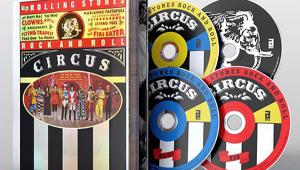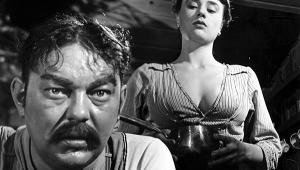4 by Agnes Varda

| The Criterion Collection Movie •••• Picture •••• Sound ••• Extras •••• |
A self-taught independent filmmaker, Agnes Varda carved out a niche for herself in pre-French New Wave cinema. Four of her most famous and best titles have been gathered together as digitally restored, director-approved DVD transfers in this extras-packed, elegantly packaged four-disc set.
Her first film, La Pointe Courte (1956), opens with a brilliant pair of tracking shots that drift past the people of the titular fishing village in an uninvolved, observant way - floating through a window and taking in a family meal before traveling on out the back door. It makes you feel like you're a voyeuristic ghost, and it announces the arrival of a great, original talent. Thereafter, with striking imagery, Varda manages to reveal the poetry in everyday actions (like unpegging laundry) in a way that had rarely been managed before. In the film's main story of a couple strolling around trying to decide whether or not to break up, nothing much happens . . . and it happens slowly. Yet because of the cinematography and the pithy dialogue, it's all fascinating, and it makes you appreciate the mystery and the beauty in ordinary things.
The black-and-white picture of La Pointe Courte - like that of the other three films in this set - is very sharp, deep-focused, and highly detailed, making visible all the grains in a pair of wooden gates, and in the wooden hut behind them. Likewise, you can see sheets hanging out to dry in the foreground, a river in the midground, and the far shore in the background. A huge array of grays helps bring all of this out. Meanwhile, the mono sound is crisp, with the dialogue clear. Music played by the local band is a bit grating in the higher registers, but I think the fault lies in the recording (as well as in the musicians' style of play), not in the audio transfer.
Clào from 5 to 7 (1962) follows a vain, shallow pop star from her home to Parisian stores, cafés, and parks while she kills time - from 5 to 7 - awaiting the results of a cancer test. Through the film's subjective style, we are allowed to share her experience as she gradually turns from self-obsessing at home to looking outward at the world and the lives of others. Her wanderings, like those of the couple in La Pointe Courte, are shown via formal (yet striking) tracking shots mixed with very naturalistic, sometimes documentary-like footage of the places she goes to and the people she sees.
The excellent transfer's good contrast supplies shiny, deep-black cars with bright headlights and a beautiful range of grays. The source elements have a lot of grain; personally, I love the look, but others may find its swirling a tad distracting. The sound, all re-looped in the studio, is clear and full.
Le bonheur (Happiness, 1965), Varda's first color film, depicts the idyllic life of a small-town carpenter, his family, and his mistress. It plays off of and deconstructs the usual depiction of happy families in movies and commercials, going to a whole new and unpredictable place. Because the negative had faded to a pink/beige mess, a new one was created from the three-color positives - and it shows in the bright images, filled with warm pastels and natural skin tones. The sound does well in handling dialogue and the Mozart score.
Vagabond (1985) is an investigation into how a pretty young woman ended up in a ditch, dead from exposure. The story is told from the point of view of the various people who came across her on her travels, each narrating to a friend or directly to the camera the effect she had on them. The DVD transfer's contrast delivers all the pale colors of rural France in winter - the grays, greens, and browns of the fields, farm villages, and small towns that the woman hitchhikes through. These tones are set off by the occasional deeply black dog, rich crimson coat, blue overalls, and bright yellow hub of a tractor. Images are sharp at times, soft at others, but the picture is pleasingly bright and clean.
Each film has an introduction by the director. Also included are vintage and new interviews with Varda talking about her early career, featurettes in which she unites with members of the cast of each film, a 5-minute video in which she asks people for their definition of happiness, three charming shorts by Varda (one featuring performances by Jean-Luc Godard and Anna Karina), a 15-minute discussion of Le bonheur by four French intellectuals, and a book filled with essays and behind-the-scenes photos. Then there's a very short piece with Madonna, who on being interviewed for French TV declares a desire to star in a remake Clào. Thankfully, this project has never come to pass.
- Log in or register to post comments






























































